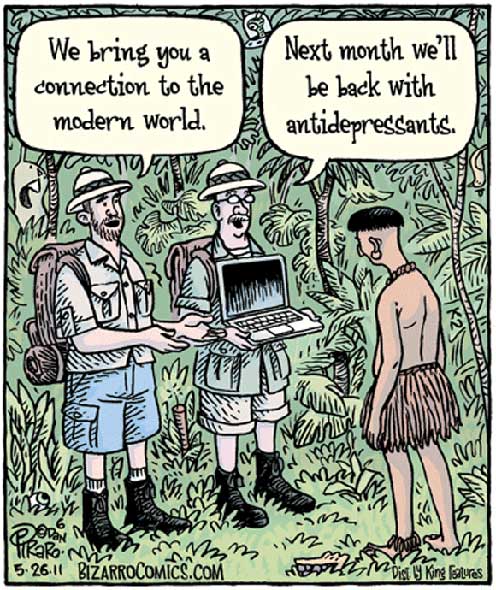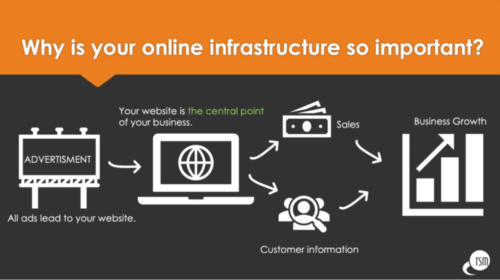Marketing, advertising, and the search for meaning.
 A funny thing happened on the way to the digital age. As advances in technology wired us all together; information became cheap and easy to access; consumer choices exploded; and our options for getting, knowing, and sharing practically anything expanded exponentially . . . we collectively reached the point of saturation. Even our lovable millennials, who have never known anything but the digital age, are looking around and asking the age-old question “what’s it all about?”
A funny thing happened on the way to the digital age. As advances in technology wired us all together; information became cheap and easy to access; consumer choices exploded; and our options for getting, knowing, and sharing practically anything expanded exponentially . . . we collectively reached the point of saturation. Even our lovable millennials, who have never known anything but the digital age, are looking around and asking the age-old question “what’s it all about?”
In a word, it’s about meaning. When the supply of practically everything easily meets demand, the value of practically everything diminishes. What’s left is an uneasy vacuum, a gnawing feeling that all this stuff and all this information aren’t providing what we really need.
We humans have always had an obsession with stuff; that’s nothing new. What’s new is how easy it has become to acquire stuff—not just material things but also information, ideas, opinions, attitudes, thoughts and emotions. We’re exhausting ourselves with the intake of everything but what we really need. We have succeeded in creating a world where it’s easy to acquire more stuff, yet this stuff doesn’t fill our lives with meaning. And we are beginning to react.
Aging baby boomers feel all bought out. Millennials, feeling like the first generation in history that won’t be able to create a higher quality of life than their parents, are disillusioned with consumerism. And in between, Generations X and Y, products of the “self-esteem first” era of parenting, are discovering that all that self-esteem hasn’t really delivered any more meaning to their lives.
So isn’t this potential backlash against consumerism a big problem for a consumer-driven economy and the marketing that drives it? Maybe. But it also represents an opportunity. People are always going to purchase goods and services. But that which has value to people is shifting. The challenge for marketers is to make a corresponding shift, not only in what we sell but also in how we present our selling messages. Here are 10 random thoughts on how marketers can meet the meaning challenge:
Focus not on the transaction of the sale, but on the delivery of an experience.
The old advertising buzz words “features and benefits” aren’t necessarily passé, they just need to be defined differently. Whatever product or service you’re marketing is going to deliver some kind of experience. Can you describe that experience in a way that strikes a responsive chord in your potential customers? More importantly, do you understand the experience for which they are yearning?
Be relevant.
Consumers are smarter, more discerning, and armed with more data than ever before. Establishing a relationship with them requires bringing relevance to that relationship, a genuine applicability to what is important to them.
Listen.
You can’t deliver meaning if you don’t understand what is meaningful to your customers. You gain understanding by listening proactively through surveys, focus groups, social media and point-of-sale interaction.
Keep your promises.
Accountability has not often been a strong suit of marketers. You can’t do everything right every time, but being accountable can in itself bring meaning to your customers and your relationship with them
Understand the emotional connection you’re creating between your brand and your customers.
This thing we call meaning is something people experience on an emotional level. You can’t fake it or pretend it’s integral to your brand if it just isn’t. Go beyond simple brand awareness to positioning your brand on a deeper, more emotional level.
Establish and nurture relationships.
Ironically, the more technology has connected us together the more isolated people feel. In my opinion, this is a major driver of the search for more meaning. People want to feel connected, not to a device, but to other people who share their ideas, values, opinions, etc. Bring your people out from behind your brand and develop relationships with your customers.
Be real.
There’s nothing so meaningless as that which is obviously fake. You can only bring meaning to your marketing if you’re solidly grounded in exactly what you are and what that can truly mean to your customers.
Understand your limits.
Meaningful marketing is the ultimate in niche marketing. The more tightly you segment your selling proposition the more success you’ll have in connecting with consumers on a meaningful level. That means a whole lot of consumers with whom you can’t connect because what is meaningful to them is different. Let them go.
Be unforgettable.
Being remembered and thought about are the cognitive cousins of feeling emotionally connected to something. Be remembered by applying relevant meaning to your product or service in a unique way, then articulating that in an emotionally unforgettable way.
Inculcate an “it’s not about me” culture within your organization.
It’s easy to say that the most important person on the phone, in your store or on your website is the customer but it’s harder to do. Do what’s harder.
And your thoughts?





